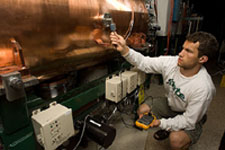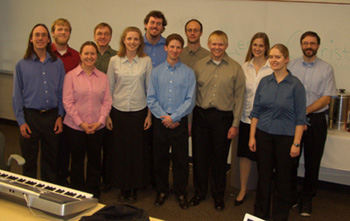What Makes MSU Unique?
Exploring Research Opportunities
 At MSU, you can choose areas of research ranging from acoustics to quantum computing. With the plethora of choices, incoming
students gain flexibility in choosing their field of choice, especially if they are
not quite sure what they wish to pursue. Specifically for the purpose of seeking the
best match to the student's interest, we offer the PHY800 courses: a chance for you
to do research with a group for course credit with no obligations. You might find
the 800 course as a great way to spend the summer between undergrad and graduate school
or during the summer at the end of your first year.
At MSU, you can choose areas of research ranging from acoustics to quantum computing. With the plethora of choices, incoming
students gain flexibility in choosing their field of choice, especially if they are
not quite sure what they wish to pursue. Specifically for the purpose of seeking the
best match to the student's interest, we offer the PHY800 courses: a chance for you
to do research with a group for course credit with no obligations. You might find
the 800 course as a great way to spend the summer between undergrad and graduate school
or during the summer at the end of your first year.
Student recruiting, Advising, and Exam Structure
The recruiting of graduate students whom we make offers to is based on a very holistic approach. Academic excellence and research experiences at the undergraduate level are important, but excellence is not only evaluated in terms of course grades and GPA's. We look at a much broader range of experiences and value leadership, contributions to a diverse (educational) community, and personal circumstances experiences. We strive for the department to be a welcoming and inclusive environment for all students to thrive.
When you are accepted in the program and come to MSU, you will be provided with tailored advice for courses to take. This advice is based on your own assessment, the information you provide to us, and a conversation between the you, the Graduate Program Director, and another faculty member, usually someone from the research field you have indicated most likely to work in. There is no qualifying/placement examination at the start of graduate school.
The core coursework consist of 4 subject-exam courses (classical mechanics, quantum mechanics, electrodynamics, and statistical mechanics), which students typically complete by the end of the fall semester of their second year. However, we fully recognize that some students come in with some gaps in their preparation and accommodate such circumstances by adapting a individual course sequence that can include some upper-level undergraduate course work. In parallel to the subject-exam courses, other, more specialized courses are taken, including survey courses of specific research fields. The comprehensive exam consist of the 4 subject exams and an oral exam. The latter consist of a presentation about a research topic and also serves as your first meeting with the guidance committee for your Ph.D. research. The committee will continue you to give tailored advice throughout you Ph.D. studies.
Interdisciplinary research and FlexibLe Course schedules
The Physics and Astronomy Graduate Programs provide a lot of flexibility to take a variety of courses in other disciplines. This is due in part because many of the research groups in the department operate on the interface of multiple disciplines and faculty see the value of students pursuing multidisciplinary activities.
Student pursue courses, certificates, and dual degrees. Popular are certificates in dual degrees with Computational Math, Science, and Engineering (CMSE), teaching certificates, a certificate in Accelerator Science, and dual degrees with Engineering. The list of multidisciplinary activities continues to grow. Students also are able to take individual courses that benefit their career development, including in languages, chemistry, project management, and specialized coursework in other departments.
Graduate student organizations
Graduate students in the Department are active across a variety of organizations on and beyond campus. The Physics Graduate Organization (PGO) plays in important role in departmental governance and actively participates in most departmental committees. They also organize activities for graduate students and coordinate amongst students, for example through surveys.
The Women and Minority for Physical Sciences (WaMPS) graduate student organization organizes a wide range of activities that benefit diversity and inclusion in the department and beyond, including outreach activities. WaMPS also organizes a peer-mentoring program for graduate students, which almost all incoming student participate in and benefit from.
In addition to the above organization, graduate student in the department are active in other student organizations, such as the Graduate Employees Union (GEU) and the Council of Graduate Students (COGS).
Grand Canonical Ensemble 
Students, staff, and faculty are engaged in a wide variety of extra-curricular events. One great example is the Grand Canonical Ensemble: a small a cappella choir comprised mainly of graduate students and faculty of the physics department and friends thereof. The ensemble is open to singers of all levels of ability and no formal auditions take place. Their repertoire is ergodic in genre space, exploring music from renaissance to pop. A subset of the GCE is Choir++, an elite ensemble which tackles more difficult music.
Proximity and Convenience
Given the size of MSU campus (5,200 acres with 579 buildings) you may worry that you'll spend much of your day walking from one place to another. However, most research facilities are in colse proximity to student's offices:
- The BPS Bldg. (where most physics classes are held) is near the buildings which house the chemistry, engineering, and math departments.
- The Facility for Rare Isotope Beams, which hosts about 50% of the Physics and Astronomy Graduate Student is only a courtyard away from the BPS.
- Both the campus bus terminal and a parking garage are across the street from BPS and FRIB.
- The graduate dorm, Owen Hall, is only a block away from the BPS Bldg.
Therefore, it is easy to get together and communicate with other graduate students and members of the department.